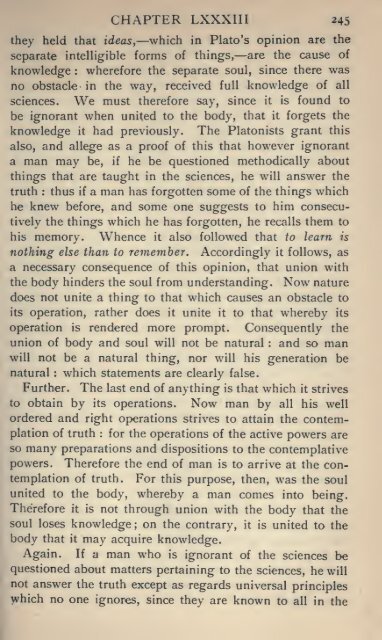summa-contra-gentiles
Summa
Summa
Create successful ePaper yourself
Turn your PDF publications into a flip-book with our unique Google optimized e-Paper software.
CHAPTER LXXXIII 245<br />
they ideas,— held that which in Plato's — opinion are the<br />
separate intelligible forms of things, are the cause of<br />
knowledge wherefore the : separate soul, since there was<br />
no obstacle in the way, received full knowledge of all<br />
sciences. We must therefore say, since it is found to<br />
be ignorant when united to the body, that it forgets the<br />
knowledge it had previously. The Platonists grant this<br />
also, and allege as a proof of this that however ignorant<br />
a man may be, if he be questioned methodically about<br />
things that are taught in the sciences, he will answer the<br />
truth ; thus if a man has forgotten some of the things which<br />
he knew before, and some one suggests to him consecutively<br />
the things which he has forgotten, he recalls them to<br />
his memory. Whence it also followed that to learn is<br />
nothing else than to remember. Accordingly it follows, as<br />
a necessary consequence of this opinion, that union with<br />
the body hinders the soul from understanding. Now nature<br />
does not unite a thing to that which causes an obstacle to<br />
its operation, rather does it unite it to that whereby its<br />
operation is rendered more prompt. Consequently the<br />
union of body and soul will not be natural : and so man<br />
will not be a natural thing, nor will his generation be<br />
natural : which statements are clearly false.<br />
Further. The last end of anything<br />
is that which it strives<br />
to obtain by its operations. Now man by all his well<br />
ordered and right operations strives to attain the contemplation<br />
of truth for the :<br />
operations of the active powers are<br />
so many preparations and dispositions to the contemplative<br />
powers. Therefore the end of man is to arrive at the contemplation<br />
of truth. For this purpose, then, was the soul<br />
united to the body, whereby a man comes into being.<br />
Therefore it is not through union with the body that the<br />
soul loses knowledge; on the <strong>contra</strong>ry,<br />
it is united to the<br />
body that it<br />
may acquire knowledge.<br />
Again. If a man who is<br />
ignorant of the sciences be<br />
questioned about matters pertaining to the sciences, he will<br />
not answer the truth except as regards universal principles<br />
which no one ignores, since they are known to all in the


















